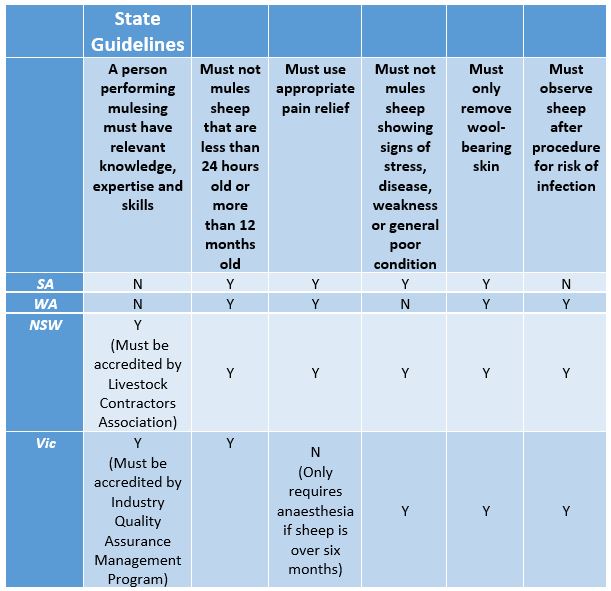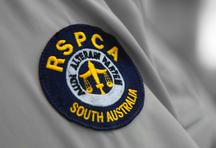Why SA needs to follow New Zealand’s ban on the painful practice of sheep mulesing
February 11, 2019The country known to have more sheep than people recently announced a nationwide ban on the cruel practice of mulesing, amid critical consumer demand.
New Zealand is leading the way, and possibly now the market, by taking the first step and introducing new legislation under the country’s Animal Welfare (Care and Producers) Act 2018.
In Australia, meanwhile, progress towards a complete end to mulesing has been relatively slow.

But what even is mulesing?
Sheep are unfortunately susceptible to flystrike, a potentially fatal condition that occurs when blowflies lay eggs in wet and dirty wool around sheep’s tails.
Mulesing aims to prevent this, by cutting off this area of skin on a sheep’s rear, removing wool-bearing skin in the tail and breach area.
Mulesing was developed in 1972 and is used by many sheep farmers as a routine husbandry procedure. It is most commonly used with Merino sheep, whose woolly wrinkles and folds in the skin around their tails make them especially susceptible to flystrike.
Mulesing prevents the risk of maggots because, unlike dirty wool, the scarred skin is not a good breeding ground for them.

So why is it so bad? Well, it causes horrific pain, for a start
Many animal welfare organisations oppose mulesing because of the pain it causes. Lambs are forced to lie on their backs in a metal cradle with their legs restrained between metal bars while the skin and wool around their tails is cut off.
This is very often done without any use of anaesthetic or pain relief.
Research has shown that the pain inflicted on lambs from mulesing is similar to castration and is felt for at least 48 hours.
Wool producers in Australia have animal welfare legislation specific to their state or territory, meaning no general consensus or enforceable guidelines exist to ensure the procedure is done as humanely as possible.
But actually, mulesing is not needed at all on properties in low risk areas, such as those with lower rainfall, low temperatures or high wind speeds. Blowflies tend to only inhabit areas that are warm and receive medium to high rainfall.

Five million Aussie lambs endure mulesing without pain relief each year
Anaesthetic sprays like Tri-Solfen have been on the market since 2011. (Tri-Solfen® is applied to the surgical site after mulesing, meaning the lamb still experiences pain and distress during the procedure.)
It is difficult to determine just how many sheep producers use pain relief when mulesing because recent surveys have come up with different results. A survey of 600 sheep farmers conducted between October 2015 and April 2016 found that, nationally, 69% of sheep producers did not use pain relief when mulesing. (In South Australia, 57% did not use pain relief while Queensland recorded the highest percentage – 95% responded they did not use pain relief.)
Meanwhile, another survey conducted in 2017 found that around 80% of Australia’s sheep producers were using pain relief.
Despite the differing results, one thing is clear. There are still many sheep producers in Australia who do not feel it necessary to provide any form of pain relief during this surgical procedure, or during other invasive procedures such as tail docking and castration. It is done far from the public eye and with little evidence that even the minimal regulations that exist are being enforced.
RSPCA Australia Senior Scientific Officer Melina Tensen has estimated that over 5 million merino lambs undergo the brutal procedure without pain relief each year in Australia.
“If growers don’t understand the need to end mulesing, or respond to community revulsion at the painful practice, they should listen to the buyers of their product,” Ms Tensen says.

The good news? South Australia leads country in treatment of lambs
On the upside, Animal Ethics Pty Ltd (the Australian company that developed the anaesthetic spray Tri-Solfen®) reported in 2015 that 82 per cent of lambs undergoing mulesing in SA between 2013 and 2015 received pain relief via anaesthetic sprays. This was the highest rate among sheep producers using the sprays in Australia.
The main reason for SA taking a lead can be found in our State’s 2012 Animal Welfare Regulations. These regulations require all lambs to have appropriate pain relief prior to and during mulesing.

Other states, including NSW (Australia’s biggest wool producer), do not enforce any legislation around mulesing. The only requirement in NSW is that those carrying out the procedure must be “professionally trained” by contractors accredited by the Livestock Contractors Association.
The table below summarises the different state regulations and guidelines around mulesing.

Why mulese when more humane options exist?
RSPCA Australia’s policy on mulesing states that “it should not be done if other humane procedures can be used to protect sheep from flystrike”.
Alternate approaches include:
- The use of chemical treatments that prevent flystrike.
- Effective control of scouring (the management of internal parasites including intestinal worms).
- Breed sheep selectively to make them less susceptible.
- Regular inspections to ensure cases of flystrike are detected and treated before they cause serious harm.
RSPCA – like other concerned animal welfare organisations and individuals – hopes that it won’t be long before Australia follows New Zealand’s lead and bans mulesing altogether.

Australia will face fashion industry backlash if we don’t change
Pressure continues to mount on Australia’s wool industry to completely eradicate mulesing – and not just for animal welfare reasons.
Continuing to fight flystrike using such a primitive, inhumane method also threatens Australia’s dominance of the international wool market as buyers, responding to consumer concern, place a premium on wool from non-mulesed sheep.
The fashion industry leads the charge for a more ethical supply chain.
Major fashion brands such as Country Road, Hugo Boss, ADIDAS, GAP, H&M and Abercrombie and Fitch haven’t using mulesed wool since 2010 and have encouraged other brands to follow suit. Global brands are making the switch to non-mulesed products as consumer demand rises.

Overall, New Zealand remains way ahead of the flock with its ban on mulesing due to come into effect from October 1, 2018.
RSPCA Australia Senior Scientific Officer Melina Tensen says Australian sheep producers need to catch up.
“Mulesing plus pain relief is a good interim step,” Ms Tensen said. “But mulesing without a breeding strategy for flystrike-resistant sheep is unacceptable, even if pain relief is used.”
You can learn more about the RSPCA’s position on mulesing and flystrike management here.
So what can you do to help Australia make the much-needed move? Support our calls for a ban and help us raise awareness about the cruelty of mulesing by making a donation here.




what!!!!!!!!!!!!!!!!!!!!!!!!!!
This is disgusting and I was unaware of the procedure until I looked into Ugg . This will definitely affect mine and my family’s purchase choice and unless I see it stated clearly on the packaging, it wont be coming into my home.
I cannot believe how cruel some farmers can be. It’s a shame we vant castrated them without pain relief, to remind them of what they are putting these creatures through.